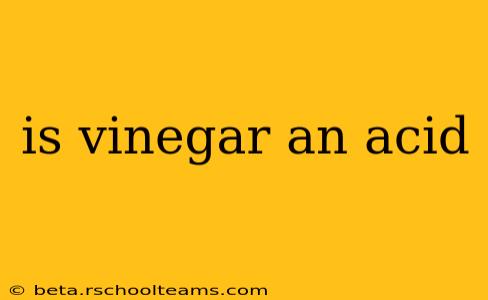Vinegar, a staple in many kitchens worldwide, is indeed an acid. But understanding why it's acidic and what that means for its various uses requires a deeper dive into its chemical composition and properties. This post will explore vinegar's acidity, its applications, and some common misconceptions.
The Chemistry of Vinegar's Acidity
Vinegar's acidity stems from its primary component: acetic acid. Acetic acid (CH₃COOH) is a weak organic acid, meaning it doesn't fully dissociate into ions when dissolved in water. This contrasts with strong acids like hydrochloric acid (HCl), which completely ionize. While weak, acetic acid still possesses the characteristic properties of an acid, such as a sour taste and a low pH value.
pH Levels and What They Mean
The pH scale measures the acidity or alkalinity of a substance, ranging from 0 to 14. A pH of 7 is neutral. Values below 7 indicate acidity, while values above 7 indicate alkalinity. Vinegar typically has a pH ranging from 2 to 3, making it significantly acidic. This low pH is responsible for many of vinegar's characteristic properties and applications.
Common Uses Leveraging Vinegar's Acidity
Vinegar's acidity makes it incredibly versatile, finding uses in various fields:
Culinary Applications
- Flavor enhancer: Vinegar's sharp, tangy flavor adds depth and complexity to many dishes, from salads and marinades to sauces and pickles.
- Preservative: The acidic environment inhibits the growth of microorganisms, extending the shelf life of foods like pickles and jams.
- Tenderizer: Vinegar's acidity can help break down tough proteins in meat, making it more tender.
Cleaning and Household Uses
- Descaling agent: Vinegar's acidity effectively removes mineral deposits (scale) from kettles, coffee makers, and showerheads.
- Disinfectant: While not a substitute for strong disinfectants, vinegar's acidity can help kill some bacteria and fungi.
- Weed killer: Vinegar's acidity can damage or kill weeds, although stronger solutions are often needed for effective weed control.
Other Applications
- Dyeing: Vinegar is used as a mordant in natural dyeing processes, helping the dye bind to the fabric.
- Gardening: Vinegar can be used to adjust soil pH in some instances, though care must be taken to avoid harming plants.
Misconceptions about Vinegar's Acidity
While vinegar is acidic, it's important to avoid some common misconceptions:
- Not all vinegars are equally acidic: The acidity of vinegar can vary depending on the type of vinegar (e.g., apple cider vinegar, white distilled vinegar) and its concentration.
- Vinegar is not a corrosive acid: While acidic, vinegar is not strong enough to damage most surfaces. However, prolonged exposure to certain materials, particularly certain metals, can cause reactions.
- Vinegar is not a universal cleaner or disinfectant: While useful for some cleaning and disinfecting tasks, vinegar should not be considered a substitute for stronger cleaning agents or disinfectants in all situations.
Conclusion
Vinegar's acidity, stemming from the presence of acetic acid, is fundamental to its many applications. From culinary uses to cleaning and other purposes, understanding its acidic nature allows us to effectively utilize its properties safely and efficiently. Always remember to handle vinegar with appropriate care and to be mindful of its potential effects on different materials.
